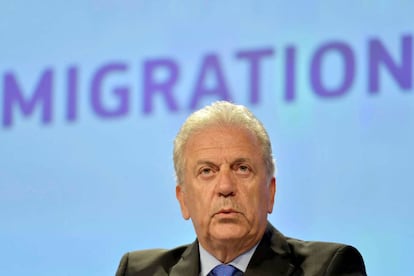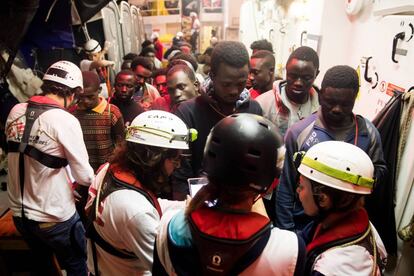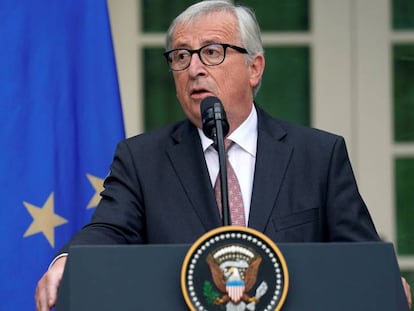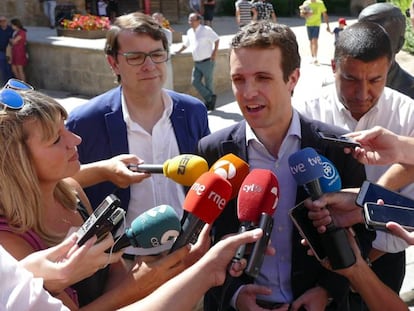¡°I congratulate Spain for the ¡®Aquarius¡¯ but it can¡¯t go on this way¡±
Ahead of a visit to Madrid, the EU Commissioner for Migration discusses strategies to address the immigration crisis facing Europe

The EU Commissioner for Migration, Dimitris Avramopoulos, is traveling to Madrid on Friday to meet with members of the Pedro S¨¢nchez administration and discuss immigration pressure along Spain¡¯s Mediterranean coastline.
Populism must be fought, not imitated
In a telephone interview with EL PA?S, Avramopoulos said that his goal is to show Brussels¡¯ solidarity with Spain, which is also being expressed with €3 million in extra funding. But the commissioner also brings a recommendation that is likely to prove controversial: that the so-called ¡°controlled centers,¡± a concept developed by the EU to manage migration flows, ¡°could help¡± prevent undocumented migrants from dropping off the radar as soon as they reach the shore, a point that hampers Europe¡¯s policy of returning anyone without the right to asylum.
Question: Spain has requested more emergency aid to handle the increase in irregular migrant arrivals in the Mediterranean. What can you offer the Spanish government?
Answer: Let me begin by praising all the work that Spain has done managing migration flows. The European Commission can offer financial, operational and technical support: right now, 195 people, two ships, one airplane and one helicopter from the European Border and Coast Guard Agency are helping Spain protect its borders day and night. We are also providing financial support: besides the €692 million in long-term funding for migration, border and security management between now and 2020, the Commission has granted Spain nearly €30 million in emergency funds to handle the increase in arrivals. Two weeks ago we already released €25.6 million and now, in a record time of four days, we have answered the most recent request for an additional €3 million in aid.
Q. Arrival numbers doubled in 2017. Has Spain waited too long to ask for help?
A. Spain has been under pressure for a very long time. This is not something that has happened overnight. Prime Minister S¨¢nchez was right when he talked about it at the European Council. All EU leaders recognized the pressure that Spain is under as a frontline EU country. Everyone pledged to help and show solidarity. When arrivals began to increase, we reinforced the European Border and Coast Guard Agency¡¯s Indalo operation. And when Spain requested emergency assistance, we provided an immediate answer. If I am coming to Spain today, it is to express without hesitation that the EU supports Spain and will continue to do so.
One of Europe¡¯s biggest problems is the returns
Q: Do you feel that the decision by S¨¢nchez¡¯s government to take in the Aquarius [a migrant ship turned away by Italy and Malta] has had some influence? There are those in Spain who talk about a pull effect.
A. Spain has offered one of the best examples of the European spirit in terms of solidarity and I congratulate the head of government and his interior minister, Fernando Grande-Marlaska, for having taken in these people with dignity. I think that Spain reacted in a very positive way. But it cannot go on this way. And Spain must not feel abandoned by the EU. Morocco is also under pressure, and I understand how the Moroccan government feels. Spain is the country that has recommended that we take this situation very seriously, and we aim to offer Morocco our support. Morocco needs additional financing and we aim to provide it very, very soon. I visited Morocco in May, and in July we pledged to mobilize a further €55 million to help the coast guards in Morocco and Tunisia. However, we know that even more than that is required. That is why we are committed to increasing the funding this coming fall, and again in 2019.

Q. At the European Council meeting of June, there was talk about creating ¡°controlled centers¡± to determine whether irregular arrivals have the right to asylum. Do you think that Spain should establish such a center?
A. This is not something that I can decide. It is member states who must discuss it, but controlled centers represent an initiative that could help. We have to admit that one of Europe¡¯s biggest problems is the returns. In fact, the rate of effective returns has dropped instead of risen. One of the strictest mandates given to the border and coast guard officers is to return anyone who is not eligible to remain in Europe, but those returns can only take place if we know where individuals are, not if they hide. In this sense, controlled centers can help. These centers would have the backing of agencies like Eurodac, Eurojust or Frontex, which would help national authorities assess the cases of those who request asylum in Europe, and to ensure the return of those without the right to stay.
Q. In that case, is it better if Spain starts detaining the people who are arriving right now?
A. In terms of those arrivals, it is very important for their cases to be processed in an orderly and organized manner, and that cannot be done if they disappear.
Morocco is also under pressure, and I understand how the Moroccan government feels
Q. Chancellor Angela Merkel has warned that unless it is properly resolved, the migration crisis could prove a breaking point for the EU. Do you share this diagnosis?
A. It could become a threat to European democracy because populism is unfortunately exploiting the situation. We need to remember that at first, the situation caught Europe off guard, as it lacked the tools or the knowledge to manage it. But that has changed radically. The current scenario has nothing to do with what we had three and a half years ago, in 2015. Europe is much better prepared. But if we don¡¯t keep moving along the same line, then the future of the EU will be at risk, because the migration issue has a direct impact on principles and values.
So I share Merkel¡¯s fear, but also the optimism if we manage to stay united and determined to defend our values and face this situation. On the other hand, Merkel had the right reaction in 2015 and 2016 and she sent out a positive example. She paid a political price in the short run, but she finally emerged the winner, and surveys show that a majority of Germans support her immigration policy. This proves that populism must be fought, not imitated. If we follow the populists, if we adopt their language, citizens will end up voting for the original version. On the contrary, traditional parties must defend their territory and remain loyal to their principles.
English version by Susana Urra.
Tu suscripci¨®n se est¨¢ usando en otro dispositivo
?Quieres a?adir otro usuario a tu suscripci¨®n?
Si contin¨²as leyendo en este dispositivo, no se podr¨¢ leer en el otro.
FlechaTu suscripci¨®n se est¨¢ usando en otro dispositivo y solo puedes acceder a EL PA?S desde un dispositivo a la vez.
Si quieres compartir tu cuenta, cambia tu suscripci¨®n a la modalidad Premium, as¨ª podr¨¢s a?adir otro usuario. Cada uno acceder¨¢ con su propia cuenta de email, lo que os permitir¨¢ personalizar vuestra experiencia en EL PA?S.
?Tienes una suscripci¨®n de empresa? Accede aqu¨ª para contratar m¨¢s cuentas.
En el caso de no saber qui¨¦n est¨¢ usando tu cuenta, te recomendamos cambiar tu contrase?a aqu¨ª.
Si decides continuar compartiendo tu cuenta, este mensaje se mostrar¨¢ en tu dispositivo y en el de la otra persona que est¨¢ usando tu cuenta de forma indefinida, afectando a tu experiencia de lectura. Puedes consultar aqu¨ª los t¨¦rminos y condiciones de la suscripci¨®n digital.










































